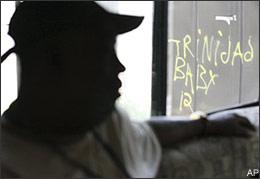Advertisement
AIDS in America
Resume
The HIV/AIDS rate in the U.S. capital is higher than in West Africa. On par with Uganda. At three percent, we learned, the capital’s infection rate now approaches the rate of San Francisco at the height of the AIDS scare. And this when many Americans have come to see HIV/AIDS as a monster that’s been tamed.
What do the new Washington numbers really mean, for the capital and the country? Who’s sick, and why?
This hour, On Point: HIV/AIDS in D.C., and across the nation, now.
You can join the conversation. Did you think the AIDS epidemic was behind us? Is it, in your community? Your state? What's the meaning of the numbers from the District of Columbia?Guests:
Joining us from Washington is Jose Antonio Vargas, Pulitzer Prize-winning reporter for The Washington Post. His front-page story on Sunday reported on the new HIV/AIDS numbers released by the District yesterday. And today he reports that the reported 3 percent rate is likely too low. He wrote a year-long series on HIV/AIDS in the nation’s capital in 2006, and he's the screenwriter and co-producer of a forthcoming documentary based on his HIV/AIDS reporting, called “The Other City."
Also from Washington, we're joined by Shannon Hader, senior deputy director of the District of Columbia Department of Health, HIV/AIDS Administration, which yesterday released its report (pdf) finding that 3 percent of the District's residents are living with HIV/AIDS. Previously she led the Centers for Disease Control and Prevention’s (CDC) work in Zimbabwe, and helped coordinate the 2007 HIV Implementers Meeting in Rwanda, the first worldwide meeting of its kind.
And joining us from New York is Phill Wilson, founder and executive director of the Black AIDS Institute, a group dedicated to ending AIDS in African-American communities. From 1990 to 1993, he served as the AIDS Coordinator for the City of Los Angeles and worked as the director of policy and planning at AIDS Project Los Angeles from 1993 to 1996.
This program aired on March 17, 2009.